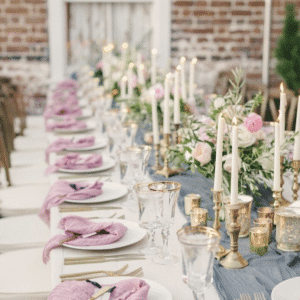Well, it ALL went wrong. I left myself open to all sorts of liability and lacked any sort of clarity in my contracts. I also took ages to establish any sort of contracts with my team of planners as I grew the Chancey Charm brand. Contract employee relationships went south, clients wanted out of final payments, and that money I “saved” by writing my own contracts was out the window – along with my sanity.
Fast forward a few years, and I finally invested in a solid contract, protected my peace of mind, and I’ve never looked back. The power of a solid contract that sets expectations with both clients and contractors ( or employees) is priceless, friends. It gives everyone involved complete clarity as you move forward in working together so that you all have the best experience possible.
This is your chance to learn from my mistakes so you don’t repeat them.
Inside This Episode:
- 1:15 – The mistake I made with contracts
- 3:00 – How to get contracts without hiring a lawyer
- 4:50 – 5 things to include in your wedding planner contract
Looking for a contract + payment processing platform? See the top 5 for planners here.
5 THINGS TO INCLUDE IN YOUR WEDDING PLANNER CLIENT CONTRACT
- BUSINESS HOURS (This is where you set expectations for your availability. Most Fridays you’ll be unavailable as you prepare for a wedding, and this helps clients better understand that.)
EX: Monday – Thursday : 9am – 5pm
Friday – Sunday : By Appointment Only
We consider ourselves creatives, but we function as a professional business responding to emails in a timely manner during business hours.
2. MEETINGS (This is where you set expectations for how to schedule a meeting and avoid those last minute requests to talk.)
EX: All meetings must be scheduled at least 72 hours in advance.
24 hour notice is required if you need to cancel a meeting.
3. WORKING WITH US (This is where you set expectations for how you will communicate.)
EX: Keeping track of all the details involved with your wedding can get tricky when communication is made via multiple channels. We don’t want anything to fall through the cracks. That’s why our preferred method of communication is email + our online planning program.
4. GETTING STARTED (This is where you set expectations for how and when they will be on-boarded. )
EX: Within a week of signing your contract, your planner will have your wedding customized and ready to get started within our online planning program, Aisle Planner. You will receive a personal email from Aisle Planner, inviting you to your wedding portal once it is ready.
5. PAYMENTS (This is where you set expectations for how they will pay future payments to you.)
EX: A gentle payment reminder will be sent via our online contract program, Honeybook.
Even if this information is available in other places– like your website– including it in your contracts clearly establishes expectations and ensures you are legally protected. It’s another way to provide clear communication and make sure your clients have an incredible experience as they work with you.
In addition, a strong contract protects your sanity and flexibility. When you set boundaries right off the bat, it’s much easier to keep a separation between your personal and professional life. As much as you love wedding planning, you deserve uninterrupted time with your family during your off hours. My goal is to help you build a business that provides the freedom and flexibility you’ve always dreamed of!
The bulk of this post addresses client/planner contracts, but I think it’s also extremely important to create legally sound contracts for your team if you plan on expanding your brand and taking other professionals under your name. Caroline at Engaged Legal provides contract templates for planners working with planners if this is a need you have!
Looking for a contract + payment processing platform? See the top 5 for planners here.
Cheers, friends!
Sarah
Founder, Creative Director of Chancey Charm
PIN THIS FOR LATER!














